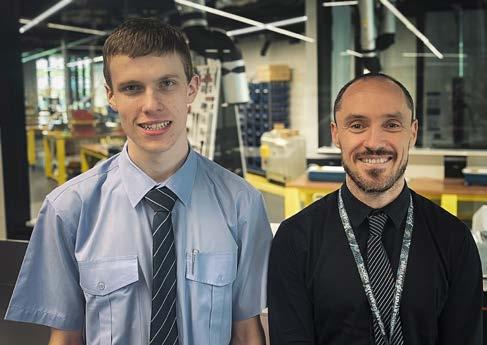
4 minute read
Driving Digital Change
Driving Digital Change
Written by Nikita Blom
BGS Connect
The redevelopment of the School Information System (SIS) is set to benefit parents, carers and the entire school community, promising improved communication and streamlined processes.
The initiative, officially branded BGS Connect, will launch this year introducing a unified parent portal, a revamped enrolment process, a new absence procedure and more.
In partnership with leading advisory group Attura, the School is on track to deliver the first phases of the platform using Microsoft Dynamics 365.
“The delivery of the new SIS is a pivotal in the digital transformation of BGS, and will offer greater capabilities for not only our students, but the School as business,” said Mr Micallef of the innovative project.
Parents will be the first to gain enhancement in experiences and communications with the School from as early Term 1 commencement in 2025, with the introduction of the new parent portal. The portal will transform the way in which parents and carers interact with the School, offering a unified and user-friendly platform for managing various aspects of their son’s education.
The parent portal is one of eight modules to be implemented as part of the upgrade and will offer parents a more streamlined, mobile-friendly and intuitive platform for staying connected with the School and will serve as a comprehensive hub for updating contact details, medical information, and managing consents, including media and photo permissions.

BGS Learn
After a successful trial with Year 12 students in 2023, BGS Learn was offered to 2024 Seniors to boost their learning and exam results. The innovative program, developed by BGS staff, provides unique exam data and custom learning tools, fostering student autonomy.
BGS Learn delivers a question-by-question breakdown of Mock Exam results for each Year 12 student.
Director of Learning Analytics, Nick Holland, emphasises the importance of high-quality
resources and skilled teachers for success.
“Teachers input data post assessments, supporting a data-driven approach that improves learning and outcomes.”
The trial phase, covering 11 of 23 subjects, showed significant performance improvements over three years. Preliminary
assessments indicate promising benefits, although it’s too early to link ATAR outcomes directly to the program.
BGS Learn uses individual student data to offer granular, personalised support, helping students make informed learning decisions.
Teachers input data post-assessments, supporting a data-driven approach that improves learning and outcomes.
Project CYAN
In an inspiring blend of innovation and collaboration, Science teacher Mr Scott Jones and Year 11 student James Lollback have developed a one-of-a-kind BGS program, named CYAN.
The project conceived by Mr Jones, was initiated to address the manual nature of reviewing and marking long assignments in science subjects. Inspired by conversations within the science department, Mr Jones set out to develop a solution that could support colleagues to enhance their digital marking capabilities and improve their productivity.
After facing limitations in his coding skills, Mr Jones collaborated with James, an enthusiastic and skilled robotics programmer in Year 11, during a Robotics Cocurricular session to create the solution.

Combining their skills and determination, the duo developed CYAN, a program designed to streamline the word counting process and resave files for marking.
“What once took a staggering five hours can now be accomplished in just 20 minutes,” which Mr Jones attributes to CYAN’s efficient algorithms and user-friendly interface.
“The goal is to save teachers significant amounts of time, allowing them to focus more on the critical task of marking and providing valuable feedback to students,” said Mr Jones.
Looking ahead, there are ambitious plans to further enhance CYAN, making it even smoother, more dynamic, and accessible to all staff at BGS.
Although James will not be available for the 2025 extension project, he says he is proud of “the really cool stuff we can do with this program”.
Scott says, “We are hoping to expand this to all departments and classes to offer benefits to staff, and hopefully students, to maximise our time when doing the assignments – which makes it just as useful.”
CYAN is named after a complex AI system featured in the popular video game Horizon Zero Dawn, reflecting the program’s advanced capabilities and innovative spirit.
What once took a staggering five hours can now be accomplished in just 20 minutes.










